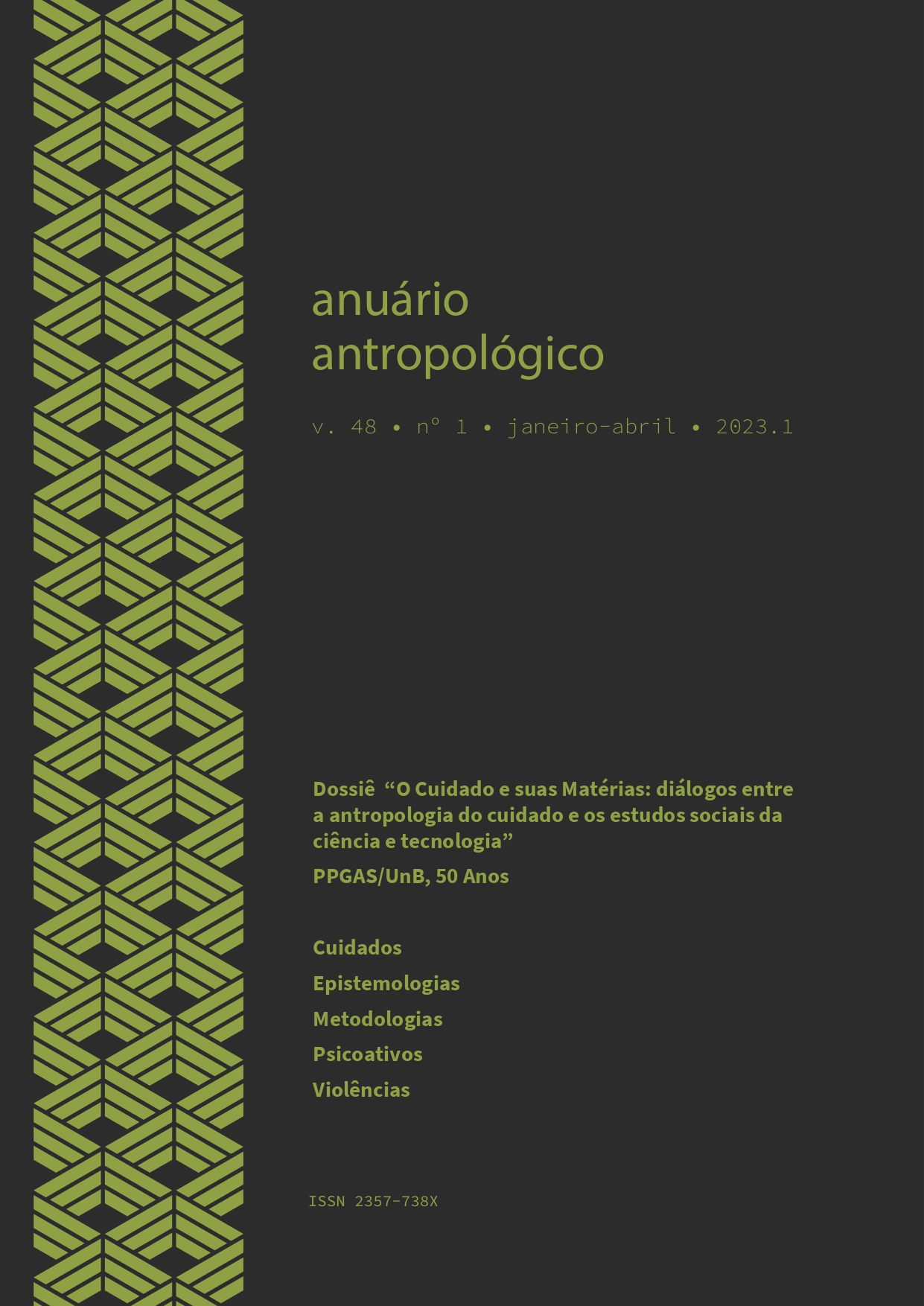Etnografia de Retalhos: Diálogos, dilemas e perspectivas metodológicas feministas para a antropologia
DOI :
https://doi.org/10.4000/aa.10626Mots-clés :
entrevista, etnografia de retalhos, metodologia de pesquisa, pesquisa antropológica, etnografia feministaRésumé
Neste material estão compiladas a tradução para o português do Manifesto por uma Etnografia de Retalhos e uma entrevista inédita realizada com duas de suas autoras, Chika Watanabe e Gökçe Günel. A entrevista aconteceu em julho de 2022, através da plataforma Zoom, e serviu para conhecer os dilemas e as perspectivas da proposta de etnografia defendida pelas pesquisadoras. O encontro também serviu para amparar e refinar o exercício de tradução que estava em andamento, permitindo o diálogo direto a respeito da abordagem de retalhos e a identificação das formas com que a proposta pode ecoar na academia brasileira.
Téléchargements
Références
Adams, Vincanne, Nancy J. Burke, e Ian Whitmarsh. 2014. “Slow Research: Thoughts for a Movement in Global Health”. Medical Anthropology 33, nº 3: 179–97.
Ahmed, Sara. 2006. “Orientations: Toward a Queer Phenomenology”. GLQ: A Journal of Lesbian and Gay Studies 12, nº 4: 543–74.
Ahmed, Sara. 2012. On Being Included: Racism and Diversity in Institutional Life. Durham: Duke University Press.
Akhil, Gupta, e James Fergunson. 1997. “Discipline and Practice: ‘The Field’ as Site, Method, and Location in Anthropology”. In Locations, Boundaries and Grounds of a Field Science, editado por Akhil Gupta e James Ferguson, 1–46. Berkeley: University of California Press.
Amit, Vered. 2000. “Introduction: Constructing the Field”. In Constructing the Field: Ethnographic Fieldwork in the Contemporary World, editado por Vered Amid, 1–18. London: Routledge.
Anjaria, Jonathan Shapiro, and Ulka Anjaria. 2020. “Mazaa: Rethinking Fun, Pleasure and Play in South Asia”. South Asia: Journal of South Asian Studies 43, nº 2: 232–42.
Bothwell, Ellie. 2018. Work-Life Balance Survey 2018: Long Hours Take Their Toll on Academics. Times Higher Education. https://www.timeshighereducation.com/features/ work-life-balance-survey-2018-long-hours-take-their-toll-academics
Burawoy, Michael. 2000. “Grounding Globalization”. In Global Ethnography: Forces, Connections, and Imaginations in a Postmodern World, editado por Michael Burawoy, Joseph A. Blum, Sheba George, Zsuzsa Gille, e Millie Thayer, 337–50. Berkeley: University of California Press.
Cerwonka, Allaine, e Liisa Malkki. 2007. Improvising Theory: Process and Temporality in ethnographic Fieldwork. Chicago: University of Chicago Press.
Cultural Anthropology, ed. 2018. “Academic Precarity in American Anthropology: A Forum”. Fieldsights.
Cvetkovich, Aann. 2013. Depression: A Public Feeling. Durham: Duke University Press.
Faubion, James. 2009. “The Ethics of Fieldwork as an Ethics of Connectivity, or The Good Anthropologist (Isn’t What She Used To Be)”. In Fieldwork Is Not What It Used to Be: Learning Anthropology's Method in a Time of Transition, editado por James Faubion e George Marcus, p. 145–64. Ithaca: Cornell University Press.
Haraway, Donna. 1988. “Situated Knowledges: The Science Question in Feminism and the privilege of Partial Perspective”. Feminist Studies 14, nº 3: 575–99.
Harrison, Faye Venetia, ed. 1991. Decolonizing Anthropology: Moving Further Toward an Anthropology for Liberation. Washington, D.C.: Association of Black Anthropologists; American Anthropological Association.
Howell, Signe. 2017. “Two or three things I love about ethnography”. HAU: Journal of Ethnographic Theory 7, nº 1: 15–20.
https://culanth.org/fieldsights/1321-academicprecarity-in-american-anthropology-a-forum
Huang, Mingwei. 2016. “Vulnerable Observers: Notes on Fieldwork and Rape”. The Chronicle of Higher Education. https://www.chronicle.com/article/vulnerable-observers-notes-on-field work-and-rape/
Johnson, Alix. 2016. Affect, Attention, and Ethnographic Research: Thoughts on Mental Health in the Field. Savage Minds. https://savageminds.org/2016/03/30/affect-attention-and-ethnographic-research-thoughts-on-mental-health-in-the-field/
Lundquist, Jennifer, e Joya Misra. 2015. “Breaking It to Your Family”. Insider Higher Education. https://www.insidehighered.com/advice/2015/12/04/how-pursue-successful-work-home-life-balance-after-gaining-tenure-essay
Marcus, George. 1995. “Ethnography in/of the World System: The Emergence of Multi-Sited Ethnography”. Annual Review of Anthropology, nº 24: 95–117.
Matthew, Patricia. 2016. “What Is Faculty Diversity Worth to a University?” Atlantic, nº 23. https://www.theatlantic.com/education/archive/2016/11/what-is-faculty-diversity-worth-to-a-university/508334/
Mcgranahan, Carole. 2006. “Introduction: Public Anthropology”. India Review 5, nº 3-4: 255–67.
Nagar, Richa. 2014. Muddying the Waters: Coauthoring Feminism across Scholarship and Activism. Chicago: University of Illinois Press,
Papacharissi, Zizi. 2015. “Affective Publics and Structures of Storytelling: Sentiment, Events and Mediality”. Information, Communication and Society 19, nº: 307–24.
Pigg, Stacy Leigh. 2013. “On Sitting and Doing: Ethnography as Action in Global Health”. Social Science and Medicine, nº 99: 127–34.
Pinto, Sarah. 2014. Daughters of Parvati: Women and Madness in Contemporary India. Philadelphia: University of Pennsylvania Press.
Pollard, Amy. 2009. “Field of Screams: Difficulty and Ethnographic Fieldwork”. Anthropology Matters 11, nº 2:1–24.
Robbins, Joel. 2013. “Beyond the Suffering Subject: Toward an Anthropology of the Good”. Journal of the Royal Anthropological Institute 19, nº 3: 447–62.
Téléchargements
Publié
Numéro
Rubrique
Licence
© Anuário Antropológico 2023

Cette œuvre est sous licence Creative Commons Attribution - Pas d'Utilisation Commerciale - Pas de Modification 4.0 International.
https://creativecommons.org/licenses/by/4.0/legalcode.en
Creative Commons - Atribución- 4.0 Internacional - CC BY 4.0
https://creativecommons.org/licenses/by/4.0/legalcode.en



